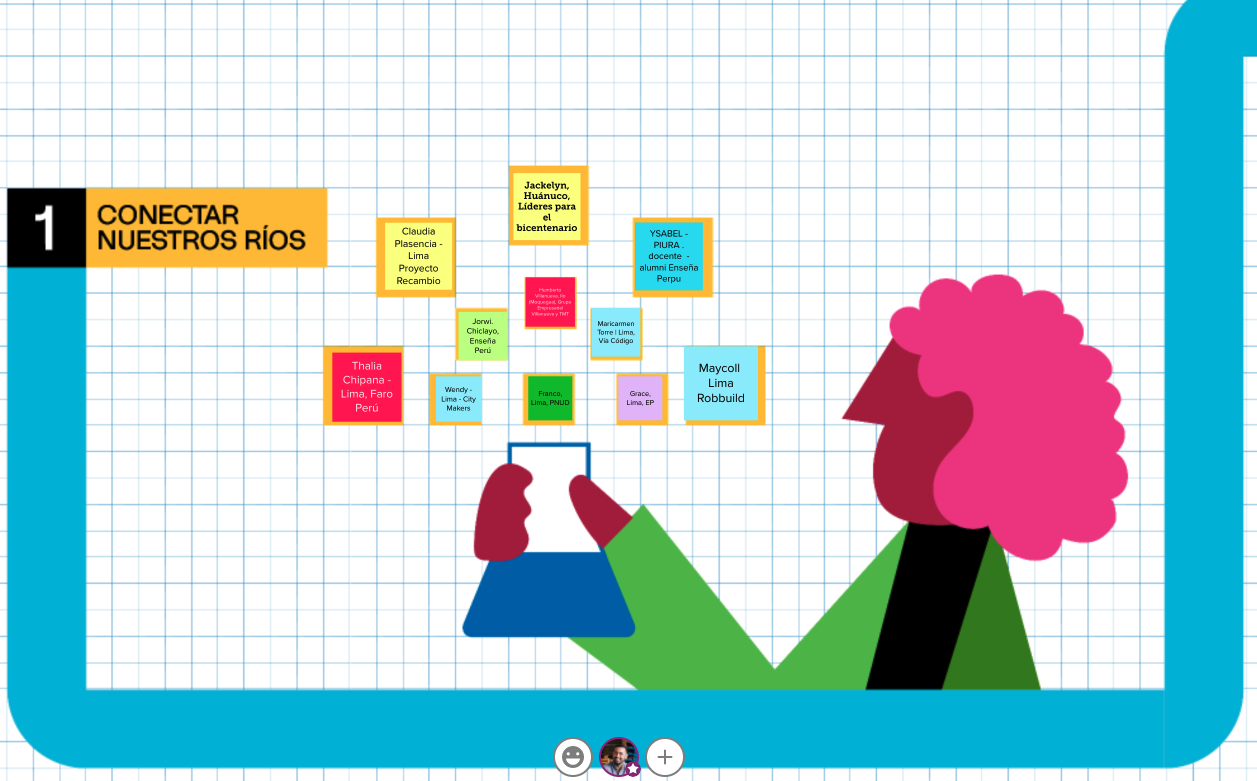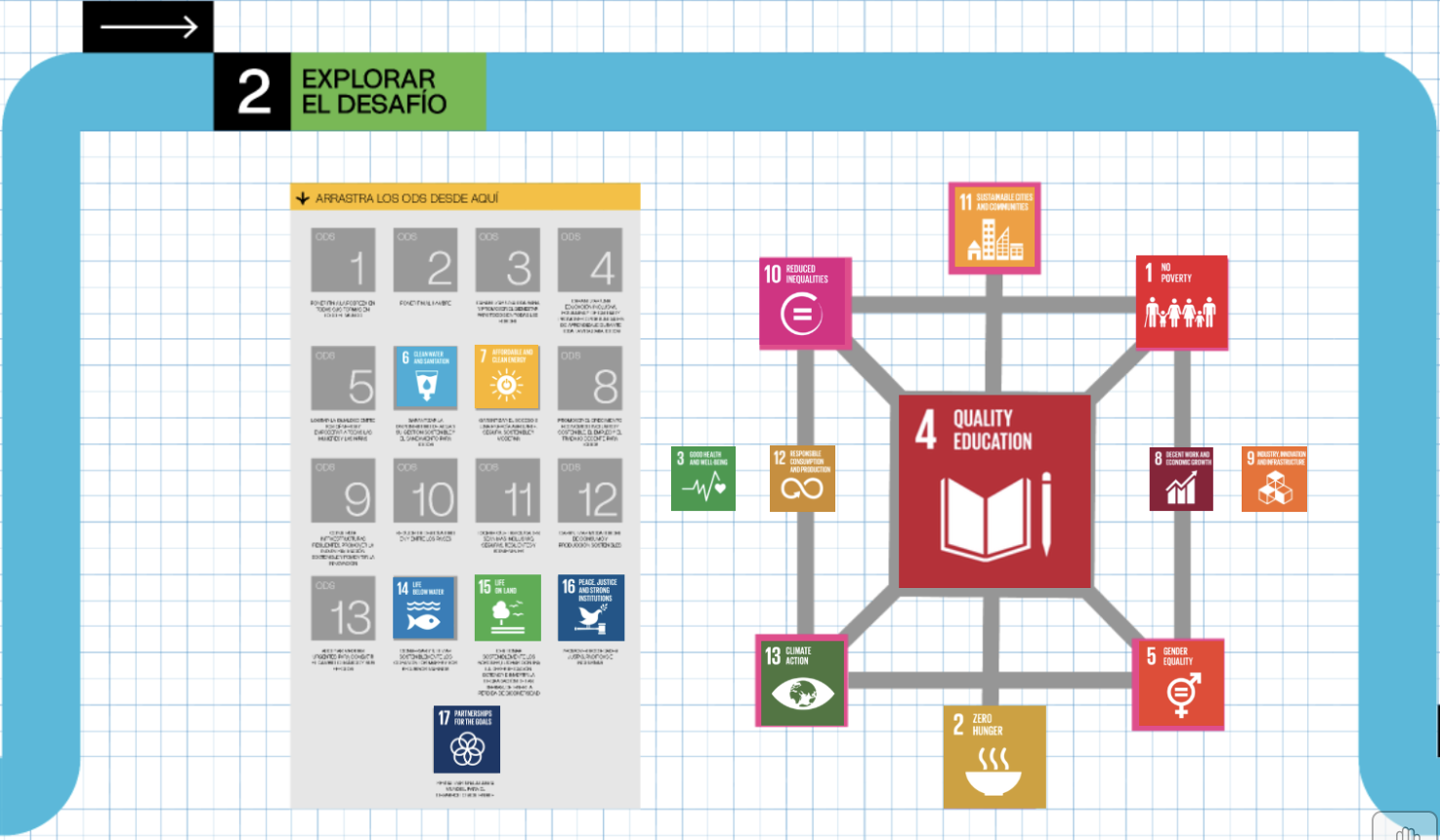By UNDP Peru Accelerator Labs
Let’s play the future, now!
13 de Julio de 2021

The art of playing takes us to an extraordinary dimension where obstacles can aggregate value and are an excuse for fun. In that sense, we designed a game through iteration and test sessions, inspired by Edgard Gouveia's proposals and thanks to the participation of Labbers from the Acceleration Lab network (Paola Constantino, Eduardo García, Cristian Gil, Jorge Munguia, Paula Mosera, Alvaro Peña), the validation facilitation methodology by designers (Javier Fernandez Ramos, Oscar Malaspina, and Eduardo Marisca), and the feedback from the Enseña Perú network.
Through gaming sessions, the method was iterated and refined until it became a fluid learning experience, visually and audibly stimulating, that is now ready to be replicated through context-specific adaptations and network growth.
Previous to starting the game session divided into 17 Zoom breakout rooms, the participants are invited to a short mindfulness exercise. When they go into their breakout room, they find a pre-designed MURAL board with a predominant SDG to lead the discussion.


Start - The river as a metaphor
Through a short guided meditation, participants connect deeply with themselves and the purpose of the game, each one visualizing himself or herself as a river. After this moment everyone is asked to draw this river (with pen and paper), and after joining the breakout room they describe it to other members of the group. The metaphor allows the participant to think of nature and the planet, while describing and presenting themselves to their team in the breakout room.
The drawing is used as an icebreaker to generate a sense of cohesion among the group participants. They share their drawings and are invited to symbolically connect themselves with nature, becoming “a single river of change”. This initial dynamic was inspired by "River of Life", an exercise shared by Ru’a Al-abweh (Solution Mapping Jordan) and Rodro Morán (Solution Mapping El Salvador) during a global call from Solution Mappers.


Once the game has started, the participants will move along the board, flowing like a river, through four areas of action in which they will be challenged to generate a dialogue, imagine and prioritize their ideas in a collective manner so they can visualize and suggest desirable future scenarios.
How to play?
Training and diversity
Zone 1 of the board invites participants to familiarize themselves by posting their first post-its with MURAL, a digital collaboration platform. They post their names, cities, and organizations so that everyone in the room can discover both the diversity of backgrounds and the levels of expertise of their team members in the breakout room.

Diamond SDG - Multidimensionality
On Zone 2 of the board, and as a warm-up, participants are challenged to build a diamond of connections and discuss the multiple cause-effect relationships that exist between the predominant SDG assigned to their breakout room and remaining 16 ones.
This exercise becomes an opportunity to reflect on the multidimensionality of the SDGs as well as to understand the approach that the team will apply in the following zone.

River of the future - The landscape
In the third zone participants are shown an image of the Peruvian territory showing the three major regions of the country: the Amazon, the Andes mountains, and the coast of the Pacific Ocean. This way, by using the Earth as the main protagonist, they are invited to fill the image with ideas while answering the question "How do you want Peru to be like in 2030 in relation to the predominant SDG?"
Very quickly the entire territory is filled with ideas inspired by the context and challenges that different regions and people face in the country. Here we see how participants create "a river of the future": constructive, positive, transformative, leaving no one behind as stated in our UNDP mantra.


Next, participants are asked to cluster the concepts, which requires them to read all the proposed ideas. This is when we push them to a sensemaking final exercise in zone 4 by allowing the thematic axes to emerge from the ideas dumped on the board. Finally, they vote and highlight the concepts they believe should be prioritized when systematizing results.

Systematization of results
The results allow us to map the concerns and desires of the different groups. The visualization of the ideas proposed points out the common patterns, resulting in output that collects the voice of civil society organized around the SDGs and placed in a local context. All information is analyzed through the protagonists of the country’s story: its citizens.

Scale up
The results of this first experience will be shared with presidential and congressional candidates in the following weeks since the country will have general elections in a month. We intend for these results to become an inspiration for decision-makers and generate value in the creation of public strategies, given that we have noticed the lack of a clear channel of communication between those that are shaping the solutions and those that are designing policy.
Scale out
Through networks of volunteer facilitators, we seek to decentralize the game and broaden citizen participation. Thereby we will enrich our understanding of country-wide young changemakers and their points of view.
Scale deep
In a fun and agile way, we will promote the generation of new connections and interactions between changemakers and help introduce role models to the new generations to come.
This is how we commemorate our first year in quarantine, opening a space and method for collectively thinking, reflecting and acting beyond the pandemic. Today we are generating relevant momentum, accelerating connections and uniting communities for the co-creation of a sustainable future, now.
Want to play?
IF YOU ARE A CHANGEMAKER within your group of friends or family, your neighborhood, your university, your community, your business, your town, your government, an international cooperation agency, or at home…we want to meet you. Email us at acclab.pe@undp.org.

 Locations
Locations